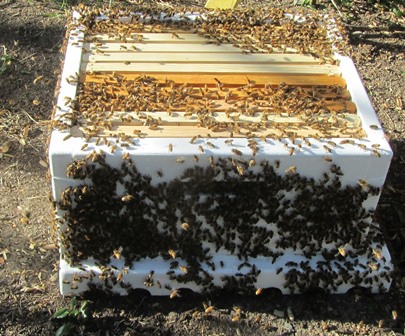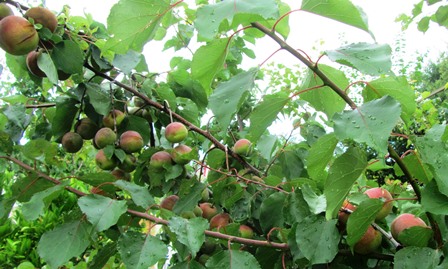Helping Our Planet’s Pollinators
Our planet’s beleaguered honeybees spend their short lives pollinating many of earth’s diverse food sources. Without bees, many of the fruits and vegetables we love would have to be pollinated by hand–an impractical option because of the intensive work and expense. Food diversity would shrink while food prices rise.
We would suffer but so would animals and wild birds that eat berries, nuts, and seeds produced by bee pollination. There’s a simple way we all can help our bee pollinators–buy and plant a packet of flower seed that attracts the bees.

Honeybees summon other bees from the swarm by doing a “waggle dance” around the top of prepared hive box
Botanical Interests, Inc., a company in Colorado, has made it easy to help the bees. The company has created a seed mixture of plants known to attract bees. Labeled as “Save the Bees,” the package makes it easy to grow plants bees love. See, https://www.botanicalinterests.com/products and search for “Save the Bees.”
The company also sells individual packets of flower seed that attracts pollinators, but the advantage of the “Save the Bees” package is that you’ll also get herbs (dill, sweet basil, and lemon mint) with your flowers. The packet contains 100 percent seed without fillers. All seeds are non-GMO and untreated. Best of all, the packet covers approximately 225 square feet and includes the following plants:
- Borage
- Sunflower, Lemon Queen
- Siberian Wallflower
- Dill
- Coreopsis, Lance Leaf
- California Poppy
- Gaillardia, Annual
- Zinnia, Lilliput
- Basil, Sweet
- Cosmos
- Purple Prairie Clover
- Globe Gilia
- Catnip
- Lemon Mint
- Black-Eyed Susan
- Goldenrod
- Lavender Hyssop
- Bergamot
Roughly eight of the plants are perennials, meaning they’ll return each year. At $4.99, it’s a deal! I purchased a couple of packets and sowed the seed in two raised beds. The seeds germinated within the specified period of 7-21 days. It’s my way of helping our planet’s little pollinators!
If you enjoy reading about keeping bees, raising chickens, creating delicious recipes and a bit of murder along the way, check out my offers from Kensington Publishing, available online and in tradition bookstores everywhere.
 Facebook
Facebook Goodreads
Goodreads LinkedIn
LinkedIn Meera Lester
Meera Lester Twitter
Twitter







